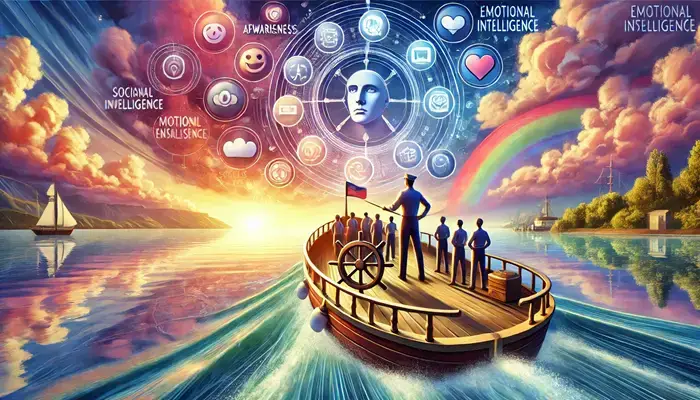Emotional Intelligence in Leadership: 5 Key Practices

Emotional intelligence (EQ) is one of the most essential skills for becoming a great leader. But don’t let the term scare you off! Emotional intelligence is about understanding emotions—your own and those of others—and using that knowledge to guide your actions.
Let’s discuss how Emotional Intelligence can make you an inspiring leader and how you can develop it.

Emotional Intelligence – A Definition
Emotional Intelligence (EQ) means being aware of, controlling, and expressing oneself and handling interpersonal relationships judiciously and empathetically.
Think of it like this: You are the ship’s captain, and your emotions help you steer in the right direction while ensuring the smooth ride of others. Emotional intelligence is like a superpower that enables you to connect with people. It’s made up of five essential parts:
- Self-awareness – Knowing what you feel and why.
- Self-regulation – Controlling how you react to your emotions.
- Motivation – Using emotions to fuel your drive to achieve goals.
- Empathy – Understanding how others feel.
- Social skills – Building strong relationships and communicating well.
Leadership is the Glue of a Team. A great leader makes people feel that there is Someone who cares, recognises their efforts and shines a light on them when they are going astray. When you master these, you’ll find it easier to lead a team, inspire others, and handle challenges gracefully.

Why Emotional Intelligence Matters in Leadership
Leadership means exercising power and authority to achieve a shared goal. Leaders have to deal with different personalities, conflicts, and high-pressure situations. If you are unaware of your emotions and those of others and lack emotional intelligence, it’s easy to let emotions take over, resulting in poor decisions and broken relationships.
But when you’re emotionally intelligent, you can:
- Stay calm under pressure – No more snapping or panicking in tough times.
- Build trust – People follow leaders they feel connected to.
- Resolve conflicts – Understand both sides and find a solution that works.
- Motivate others – Inspire your team to do their best.
- Make better decisions – Think clearly, even when emotions run high.
Doesn’t that sound like the kind of leader people want to follow?

How to Build Emotional Intelligence
The good news is that emotional intelligence is not a fixed one. It’s a skill you can develop. Here’s how:
1. Practice Self-Awareness
Pay attention to your emotions. When angry, ask yourself, “Why am I feeling this way?” When you’re happy, think about what triggered it. Journaling can help. Write down what you feel each day and what caused those feelings. Over time, you’ll see patterns that help you understand yourself better.
2. Learn to Manage Your Reactions
Let’s say someone criticises your work. Instead of lashing out or shutting down, pause. Take a deep breath and think about your response. Remember that criticism isn’t personal—it’s a chance to grow.
You can also try mindfulness or meditation to control your emotions. These practices train your brain to pause before reacting.

3. Boost Your Motivation
Ask yourself: What drives you? Is it helping others? Achieving personal goals? When you have a clear purpose, it’s easier to stay motivated, even when things get tough.
Set small goals and celebrate when you achieve them. It’ll keep you energized and focused.
4. Build Empathy
Empathy is about stepping into someone else’s shoes. When a teammate is upset, don’t just brush it off. Ask them how they’re feeling and listen. Really listen. Show that you care.
The more you practice empathy, the stronger your connections with others will be.
5. Sharpen Your Social Skills
Great leaders know how to connect with people. Practice clear communication. Learn to give feedback in a way that’s helpful, not harsh. For example, instead of saying, “You messed up,” try, “Here’s how we can improve this next time.”
Don’t forget to show appreciation. A simple “thank you” can go a long way.

Examples of Emotional Intelligence in Action
Let’s look at two leaders: one with emotional intelligence and one without.
The Hot-Headed Boss
Imagine a boss who yells at their team when something goes wrong. They don’t listen to ideas and make decisions based on emotions. How does that make the team feel? Probably stressed and unmotivated.
The Calm and Collected Leader
Now, picture a leader who stays calm during challenges. They listen to their team, consider everyone’s input, and explain decisions clearly. This leader builds trust and inspires loyalty.
Which leader would you instead follow? That’s the power of emotional intelligence.

How EQ Can Help You in Real Life
Even if you’re not leading a team yet, emotional intelligence can help you in school, work, and relationships. Here’s how:
In School – When you understand your emotions, you can handle stress better and focus on your studies. You’ll also connect with classmates and teachers more easily.
At Work – Whether working part-time or starting your career, EQ helps you deal with customers, coworkers, and bosses. You’ll stand out as someone calm, cooperative, and easy to work with.
In Relationships – Friendships and romantic relationships thrive when you’re empathetic and communicate well. Emotional intelligence can help you avoid unnecessary fights and build stronger connections.

Tips to Keep Growing Your Emotional Intelligence
- Ask for Feedback
Don’t be afraid to ask, “How can I improve as a leader or team member?” Honest feedback helps you grow. - Learn from Role Models
Look at leaders you admire. What makes them great? How do they handle tough situations? Take notes and apply what you learn. - Be Patient with Yourself
Building emotional intelligence takes time. Don’t get discouraged if you slip up. Every step forward is progress. - Read and Learn
There are many books and resources on emotional intelligence. Start with something simple, like Travis Bradberry’s Emotional Intelligence 2.0.

The Ripple Effect of Emotional Intelligence
Here’s the thing: When you work on your emotional intelligence, it doesn’t just benefit you. It impacts everyone around you. Your team will feel more supported. Your friends will feel more connected. Even strangers will notice your kindness and calmness.
Emotional intelligence creates a ripple effect, spreading positivity and inspiration wherever you go. And isn’t that what leadership is all about?

Final Thoughts
Leadership isn’t about being the loudest or the smartest in the room. It’s about understanding people—yourself and others—and using that understanding to inspire and guide. Emotional intelligence is the foundation of outstanding leadership, a skill you can start building today.
So, take that first step. Practice self-awareness, be empathetic, and learn to manage your emotions. Before you know it, you’ll be the kind of leader people admire and trust.

FAQs
1. What’s the easiest way to start building emotional intelligence?
Start with self-awareness. Please pay attention to your emotions and what triggers them. This small step will make a big difference.
2. Can emotional intelligence help me in school?
Absolutely! It helps you handle stress, work well with classmates, and communicate effectively with teachers.
3. Is emotional intelligence more important than IQ in leadership?
Both are important, but EQ often makes a bigger impact. People follow leaders they trust and connect with, and that comes from emotional intelligence.
4. Can introverts have high emotional intelligence
Of course! Introverts can be profoundly empathetic and reflective, which are key aspects of EQ.
5. How long does it take to improve emotional intelligence?
It’s a lifelong journey, but you’ll start seeing changes quickly if you practice consistently. Be patient and enjoy the growth!

Here are five insightful articles on emotional intelligence:
- “The Truth About Emotional Intelligence” – This article explores the concept of emotional intelligence, its history, benefits, and skills, with insights from experts at the Yale Center for Emotional Intelligence.
- “Emotional Intelligence: Why We Need It Now, More Than Ever” – Discusses emotional intelligence’s heightened importance in navigating modern life’s complexities, including the pandemic’s psychological effects and social challenges.
- “What Is Emotional Intelligence and Why Does It Matter?” – Provides a comprehensive overview of emotional intelligence, its components, and its significance in personal and professional contexts.
- “Emotional Intelligence” – An in-depth look at the concept, skills, and benefits of emotional intelligence, along with guidance on cultivating and measuring it.
5.“What Is Emotional Intelligence? Traits, How To Test And More” – Explores the traits associated with Emotional intelligence, methods for assessment, and its impact on various aspects of life.
These resources offer valuable insights into understanding and developing emotional intelligence.




